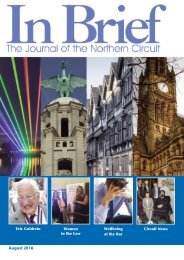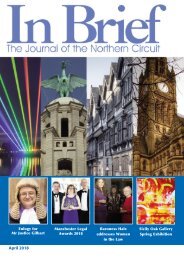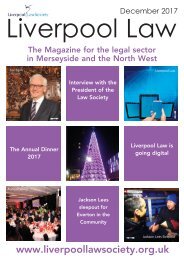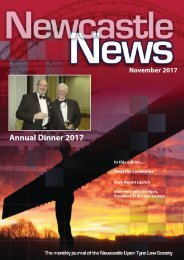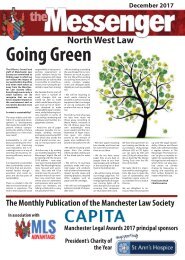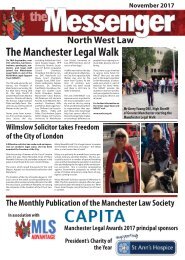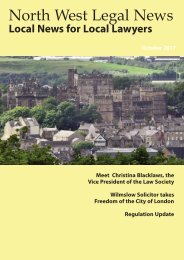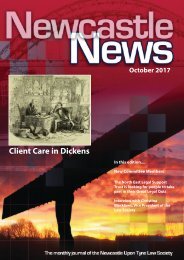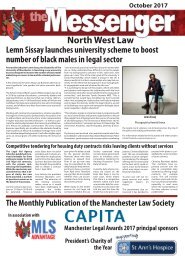MM September 2016
Create successful ePaper yourself
Turn your PDF publications into a flip-book with our unique Google optimized e-Paper software.
10 CAB News<br />
CAB - Practical Issues<br />
A few months ago I wrote<br />
in The Messenger about<br />
the work I do volunteering<br />
with Salford Citizens Advice<br />
Bureau. Experience<br />
working as a solicitor really<br />
does give you a head<br />
start in advising and helping<br />
CAB clients. However,<br />
it is a bit of a shock to the<br />
system moving from a situation<br />
where you know<br />
the answer to most questions<br />
a client may ask to a<br />
situation where initially<br />
you know very little about<br />
most questions troubling<br />
a CAB client.<br />
There is plenty of help for<br />
volunteers from their manager,<br />
from their CB training<br />
and from an online system<br />
called Advisernet but nevertheless<br />
you are in quite a<br />
different situation.<br />
So I thought I would write a<br />
column for The Messenger<br />
every few months which<br />
covers some areas where<br />
CAB clients have particular<br />
needs. Areas such as benefits,<br />
immigration and debt<br />
to name only three. Sometimes<br />
all these three will<br />
come in one enquiry. And<br />
the first subject I have is the<br />
benefit known as Universal<br />
Credit (UC).<br />
Despite much coverage in<br />
the media about the delays<br />
to the government’s major<br />
programme of reforming<br />
the benefit system, much of<br />
UC has already been rolled<br />
out across Greater Manchester.<br />
CAB are dealing<br />
with hundreds of people<br />
with enquires about the<br />
new system.<br />
The idea behind UC is that it<br />
will eventually replace all<br />
other means tested benefits<br />
such as income based Jobseeker’s<br />
Allowance and<br />
Housing Benefit. Instead of<br />
a client applying for several<br />
means tested benefits one<br />
claim for UC will cover all<br />
their means tested needs.<br />
And UC is supposed to be<br />
flexible so that when a<br />
client’s circumstances<br />
change then the amount of<br />
UC will change as well.<br />
Here are some of the new<br />
benefit’s main features:<br />
Universal Credit tops up<br />
your earnings<br />
When a client starts work<br />
the amount of Universal<br />
Credit they get may gradually<br />
reduce as they earn<br />
more. But unlike Jobseeker’s<br />
Allowance, their payment<br />
won’t stop just because<br />
they work more than 16<br />
hours a week.<br />
Work Allowance<br />
In some cases, people may<br />
be eligible for a work allowance.<br />
A work allowance<br />
is the amount that can be<br />
earned before Universal<br />
Credit payment is affected.<br />
Once earnings are more<br />
than the works allowance,<br />
UC payments will be reduced<br />
at a 65% taper.<br />
Therefore for every pound<br />
earned over the work allowance,<br />
UC will be reduced<br />
by 65 pence. Payments will<br />
change as earnings change.<br />
From April <strong>2016</strong>, the range<br />
of work allowances available<br />
was simplified. People<br />
will be eligible for a work allowance<br />
if they (and/or their<br />
partner) either:<br />
• have responsibility for a<br />
child and/or<br />
• have limited capability for<br />
work<br />
The monthly work allowances<br />
are set at:<br />
£192 (per household)<br />
If Universal Credit includes<br />
housing support<br />
£397 (per household)<br />
If they do not receive housing<br />
support<br />
If people have earnings but<br />
they (or their partner) are<br />
not responsible for a child<br />
or do not have limited capability<br />
for work they will not<br />
be eligible for a work allowance.<br />
Total income<br />
Total income will be their<br />
earnings plus any new UC<br />
payment. The more earned,<br />
the higher total income will<br />
be until no Universal Credit<br />
is available.<br />
A claim continues when<br />
someone starts work. A<br />
client can take temporary or<br />
seasonal jobs without worrying<br />
about making a brand<br />
new claim or any gaps between<br />
paydays as they<br />
move in and out of work. A<br />
claim will stay live for up to<br />
six months, even if no UC is<br />
awarded during such time.<br />
Other support to help you<br />
earn more<br />
The government’s aim is to<br />
support people on UC to increase<br />
their earnings and ultimately<br />
move off benefits<br />
altogether. These changes<br />
were brought in along with<br />
a range of measures to help<br />
clients earn more. These include:<br />
• bringing in the National<br />
Living Wage - which is set to<br />
reach over £9 an hour by<br />
2020<br />
• increasing the personal tax<br />
allowance to £11,000<br />
• increasing and providing<br />
support for eligible costs of<br />
childcare in Universal Credit<br />
to 85% and doubling the<br />
free early years provision to<br />
30 hours a week for working<br />
parents of 3 and 4 year olds<br />
Practical issues<br />
The underlying force behind<br />
the introduction of UC<br />
is to encourage clients back<br />
into work and also to encourage<br />
clients to take responsibility<br />
for their own<br />
personal circumstances.<br />
There are therefore particular<br />
areas where clients have<br />
difficulties<br />
• All claims for UC must be<br />
made online. Quite a number<br />
of clients have no access<br />
to a computer and have no<br />
skills is using one. This is<br />
having to change.<br />
• When awarded, UC is paid<br />
monthly save for exceptional<br />
circumstances. Many<br />
current benefits are paid on<br />
a weekly basis so clients<br />
have to get used to a different<br />
way of budgeting<br />
• When a claim for UC includes<br />
rent the payment of<br />
UC is made in full to the<br />
client who is then responsible<br />
for paying the rent. In<br />
the past Housing Benefit<br />
has been paid direct to the<br />
Landlord. Clients and their<br />
landlords are therefore not<br />
used to the new UC regime.<br />
This leads to many situations<br />
where the client has<br />
not budgeted for the rent<br />
and there are significant arrears.<br />
Stephen Hindmarsh<br />
• UC is currently being rolled<br />
out in various areas of the<br />
UK which include Greater<br />
Manchester. Currently not<br />
every category of new<br />
claimant is required to claim<br />
UC and clients on existing<br />
means tested benefits stay<br />
on those benefits. So CAB<br />
will be advising on both UC<br />
and the existing means<br />
tested benefits for some<br />
time to come.<br />
That’s it for UC. I’ll have another<br />
topic in a couple of<br />
months time.<br />
Stephen Hindmarsh<br />
CAB Volunteer<br />
Past President of<br />
Manchester Law Society<br />
Legal Indemnity Title Insurance<br />
Take a break...<br />
Seeing as issuing Legal Indemnity<br />
Title Insurance with GCS is so easy,<br />
why not take a break...<br />
Find out what our little bear<br />
Samuel has been up to at:<br />
www.gcs-title.co.uk/charity<br />
Call 01435 868050 to speak<br />
to an underwriter today or email<br />
underwriters@gcs-title.co.uk<br />
www.gcs-title.co.uk<br />
01435 868050<br />
underwriters@gcs-title.co.uk<br />
Guaranteed Conveyancing Solutions Limited is authorised and regulated by<br />
the Financial Conduct Authority. Registered in England and Wales No. 3623950<br />
Legal Indemnity Insurance



